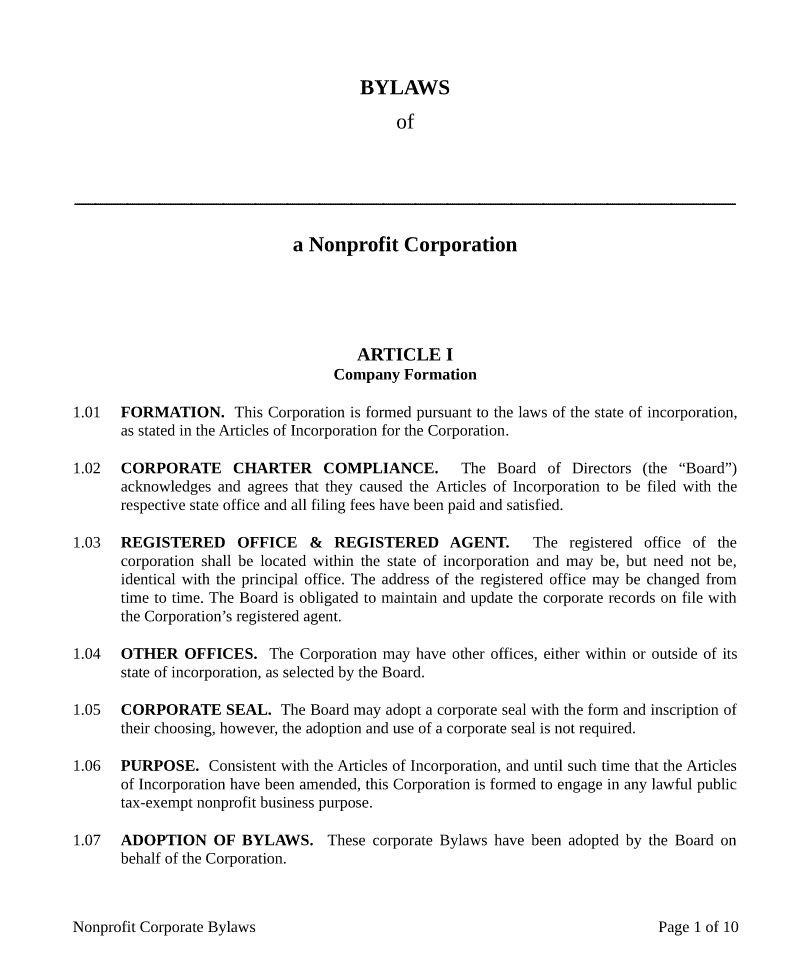Hawaii Nonprofit Bylaws
Hawaii nonprofit bylaws contain the rules and procedures that keep your organization running smoothly. Bylaws describe how your nonprofit should manage board members, take votes, keep records, and more. Your bylaws also help prevent and settle internal disputes by clarifying members’ rights and obligations. Adopting your bylaws is an essential part of your nonprofit’s formation and should not be taken lightly—strong bylaws help set your nonprofit on the right track.
Use our attorney-drafted nonprofit bylaws to get started.
Why does a Hawaii nonprofit need bylaws?
You don’t need to file your bylaws along with your Hawaii Nonprofit Articles of Incorporation with the Hawaii Department of Commerce and Consumer Affairs. However, your bylaws are still one of the most critical parts of your nonprofit’s formation and will probably become public record. Why? Find out more below.
1. Nonprofit bylaws are legally required in Hawaii.
According to the Hawaii Nonprofit Corporations Act §414D-36 either the incorporators or board of directors “shall adopt initial bylaws for the corporation.” This means that to remain in compliance with Hawaii state law, you must create bylaws when forming your nonprofit.
2. Third parties will ask to see your bylaws.
The primary third party that will ask to see your bylaws is the IRS if you apply for 501(c)(3) tax-exempt status. However, you can expect that banks, investors, and landlords will request copies of your bylaws to assess the legitimacy of your organization before conducting business with you.
3. Nonprofit bylaws allow you more control over your nonprofit.
Your bylaws act as a foundation and a shield, upholding your nonprofit’s structure and protecting it from external threats. Bylaws help prevent internal disputes by laying out the protocols for potentially tense situations like dealing with conflicts of interest, changing voting procedures, or ousting a director. This is important because disputes can lead to legal action, resulting in the state investigating your nonprofit. Such investigations can cost your nonprofit time, money, and its reputation. Keep control over your organization by adopting strong bylaws.
Want to learn more? Check out our Guide to Nonprofits.
What do Hawaii Nonprofit Bylaws include?
All Hawaii nonprofit bylaws should begin with basic details about your organization, like its name, address, and purpose. The rest of your bylaws should define the operating procedures for governing your nonprofit, laying out the specific guidelines actions such as:
- managing board members and meetings
- taking votes and meeting quorum requirements
- compensating members
- keeping records
- merging or dissolving your nonprofit
- amending your bylaws
- operating during emergencies
Under Hawaii law, your nonprofit is free to add provisions to your bylaws as desired, as long as they don’t contradict your articles of incorporation or state law.
Are nonprofit bylaws legally binding?
Yes. Your bylaws represent a legally binding agreement for those involved with running your nonprofit. Following your bylaws is necessary to stay in compliance with the law. If one of your nonprofit’s directors, officers, or employees breaks this agreement, there could be severe legal repercussions for the violating individual and your nonprofit as a whole.
Are nonprofit bylaws public record?
Not necessarily. But typically, yes. You don’t need to file your bylaws with the Hawaii Department of Commerce and Consumer Affairs. However, if you seek tax-exempt status from the IRS, you will need to attach a copy of your bylaws to your 501(c)(3) application, and the IRS makes all tax-exempt status applications public. Like many nonprofits, you may also decide to publish your bylaws in a show of transparency for your donors, supporters, and beneficiaries.
FAQs
No, your board doesn’t need to sign your bylaws. But, with that said, we highly recommend they do. If your bylaws are made public, having your board’s signatures can strengthen your reputation. First, your nonprofit will look more official. Second, it will be apparent that your board of directors agrees on how your organization will be managed and what it stands for.
Yes. When your bylaws are drafted, they should include instructions for amending themselves. In addition, we suggest evaluating your bylaws regularly to identify where you may need to update or alter a rule so that it better serves your nonprofit and how it runs.
At the first organizational meeting for your nonprofit, your board of directors or your incorporators adopt your bylaws.
